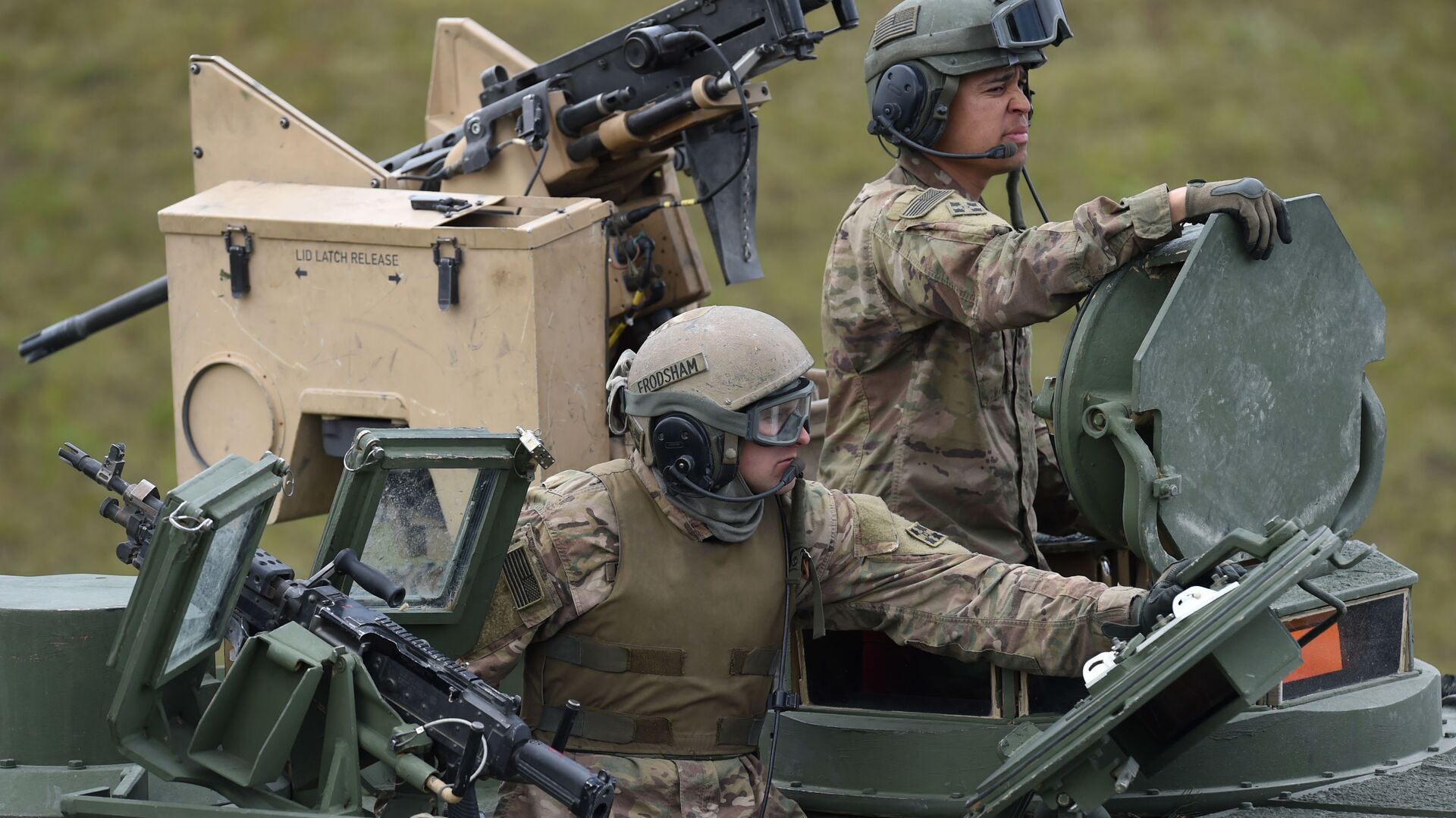https://sputnikglobe.com/20220124/embassy-evacuations--european-troop-deployments-how-us-led-militarism-makes-ukraine-crisis-worse-1092485044.html
Embassy Evacuations & European Troop Deployments: How US-Led 'Militarism' Makes Ukraine Crisis Worse
Embassy Evacuations & European Troop Deployments: How US-Led 'Militarism' Makes Ukraine Crisis Worse
Sputnik International
The Biden administration is reportedly considering the deployment of troops, warships, and aircraft to NATO allies in Eastern Europe and the Baltic states amid increased tensions with Moscow.
2022-01-24T15:21+0000
2022-01-24T15:21+0000
2022-01-30T04:49+0000
russia-nato row on european security
world
europe
us
russia
opinion
ukraine
nato expansion
nato
https://cdn1.img.sputnikglobe.com/img/107957/10/1079571024_0:143:3135:1906_1920x0_80_0_0_7cca481c48c55c5af8c969d002be86c7.jpg
"It's a psychological operation aimed at influencing respective publics' opinions and justifying the actions by US and UK governments to escalate an unnecessary and avoidable conflict further by sending 90 tonnes of lethal military aid from the US to Kiev", says Adriel Kasonta, a London-based foreign affairs analyst and former chairman of the International Affairs Committee at Bow Group, a conservative think tank in the UK.The US and UK rhetoric about "Russian invasion threats" creates "a false sense of insecurity" to gain public approval for a harder - yet completely unjustified - stance towards Moscow, according to the foreign analyst. Half of Britons told an Ipsos MORI poll they are already expecting Russia to "invade" Ukraine in 2022.At the same time, US President Joe Biden is considering additional deployments of troops, warships, and aircraft to NATO allies in Eastern Europe and the Baltic states over the alleged threat of Russia, according to a Sunday report by The New York Times. The Biden administration's options, according to the publication, include sending between 1,000 and 5,000 troops to Eastern European countries, with the potential to step up this number tenfold if "things deteriorate".There is no consensus with regard to possible actions against Russia among NATO allies, as the US president revealed during his press conference on 19 January.Differences of opinion in the European camp have also manifested themselves amid the recent push by the US for diplomatic evacuations along with the UK and Australia. The nations cite the possibility of an "invasion" as the reason for the withdrawal, though the UK admitted there are no specific threats to British diplomats. Still, only three countries have been drawing down their embassies so far, and EU countries aren't following suit, notes Weir.According to Kasonta, it is significant that the psy-op is driven mostly by the Anglophone camp and he adds that Germany's and France's unwillingness to be dragged into yet another US provocation towards Russia "speaks volumes". French President Emmanuel Macron earlier called upon the EU to start a security dialogue with Russia.Why are the US and UK making things more tense?Biden's reported plan to resort to more decisive measures against Russia over Ukraine comes as Moscow is awaiting Washington's written response on Russia's draft security proposals submitted on 15 December 2021 to US policy-makers. Russia's draft treaties include legally binding guarantees that NATO will not expand eastward, Ukraine will not be admitted to the western military bloc and member states that have joined the bloc since 1997 will quit its forces, among other measures.On 21 January, Russian Foreign Secretary Sergei Lavrov and his American counterpart Antony Blinken held "frank and substantive" talks, with the US secretary of state leaving the door open to address Russia's "security concerns".However, Biden's decision to respond "in a reactive way" to Russia's security proposals provides the US president with no benefits in political popularity, says Gilbert Doctorow, an international relations and Russian affairs analyst.The show of strength largely serves the purpose of domestic politics, as the potential buildup "cannot in any way change the outcome of a potential conflict between Russia and Ukraine, which would be very heavily in Russia's favour", Doctorow added.Biden's approval rating is in free fall over a chaotic Afghan withdrawal, soaring inflation, and the president's inability to pass any of his signature initiatives through the US Congress. Biden's apparent shift from his restrained stance on Ukraine is aimed at breathing some life into the president's waning popularity, according to Doctorow.Though the ongoing muscle-flexing may possibly be part of a broader diplomatic game, Weir warns that "that kind of posturing is in the wrong direction, definitely stepping up the danger of war"."We remember how wars can start", the journalist says. "Just over a century ago, the First World War - the most insane war - started on the flimsiest pretext. It just developed out of a few incidents and miscalculations on all sides".
https://sputnikglobe.com/20220124/biden-reportedly-eyeing-troop-deployment-to-eastern-europe-baltic-states-amid-heightened-tensions-1092474176.html
https://sputnikglobe.com/20220124/german-foreign-minister-baerbock-draws-line-between-ukraine-and-nato-amid-tensions-with-russia-1092482372.html
https://sputnikglobe.com/20220121/lavrov-blinken-talks-wrap-up-with-two-sides-on-clear-path-to-understanding-1092428420.html
https://sputnikglobe.com/20211208/is-aggressive-us-rhetoric-against-russia-the-result-of-bidens-poor-standing-at-home--1091363298.html
ukraine
Sputnik International
feedback@sputniknews.com
+74956456601
MIA „Rossiya Segodnya“
2022
News
en_EN
Sputnik International
feedback@sputniknews.com
+74956456601
MIA „Rossiya Segodnya“
Sputnik International
feedback@sputniknews.com
+74956456601
MIA „Rossiya Segodnya“
joe biden, nato military build-up in eastern europe, evacuations of embassies, russia's alleged "invasion" of ukraine
joe biden, nato military build-up in eastern europe, evacuations of embassies, russia's alleged "invasion" of ukraine
Embassy Evacuations & European Troop Deployments: How US-Led 'Militarism' Makes Ukraine Crisis Worse
15:21 GMT 24.01.2022 (Updated: 04:49 GMT 30.01.2022) After months of media panic over Russia's alleged plans to "invade" Ukraine, the US appears to have upped the stakes by contemplating new military deployments in Eastern Europe and starting embassy evacuations from Kiev along with the UK and Australia. Observers believe that America's actions are a "psy-op" fraught with risks of a real standoff.
"It's a psychological operation aimed at influencing respective publics' opinions and justifying the actions by US and UK governments to escalate an unnecessary and avoidable conflict further by sending 90 tonnes of lethal military aid from the US to Kiev", says Adriel Kasonta, a London-based foreign affairs analyst and former chairman of the International Affairs Committee at Bow Group, a conservative think tank in the UK.
The US and UK rhetoric about "Russian invasion threats" creates "a false sense of insecurity" to gain public approval for a harder - yet completely unjustified - stance towards Moscow, according to the foreign analyst. Half of Britons told an Ipsos MORI poll they are already expecting Russia to "invade" Ukraine in 2022.
At the same time, US President Joe Biden is considering
additional deployments of troops, warships, and aircraft to NATO allies in Eastern Europe and the Baltic states over the alleged threat of Russia, according to a Sunday report by
The New York Times. The Biden administration's options, according to the publication, include sending between 1,000 and 5,000 troops to Eastern European countries, with the potential to step up this number tenfold if "things deteriorate".
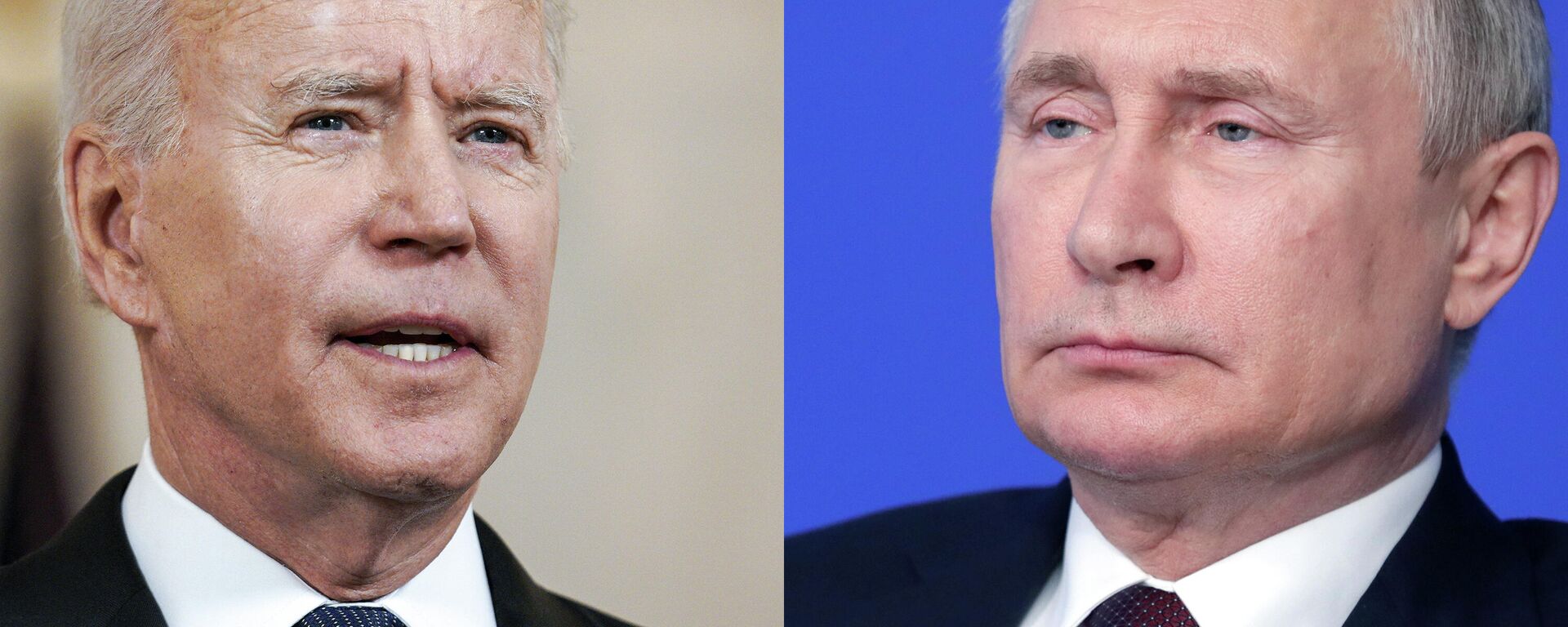
24 January 2022, 02:51 GMT
Despite the situation "definitely intensifying", neither the US nor European NATO allies are eager to fight for Ukraine, says Fred Weir, Russia correspondent for the Boston-based Christian Science Monitor.
There is no consensus with regard to possible actions against Russia among NATO allies, as the US president revealed during his press conference on 19 January.
Differences of opinion in the European camp have also manifested themselves amid the recent push by the US for diplomatic evacuations along with the UK and Australia. The nations cite the possibility of an "invasion" as the reason for the withdrawal, though the UK admitted there are no specific threats to British diplomats. Still, only three countries have been drawing down their embassies so far, and EU countries aren't following suit, notes Weir.
According to Kasonta, it is significant that the psy-op is driven mostly by the Anglophone camp and he adds that
Germany's and France's unwillingness to be dragged into yet another US provocation towards Russia "speaks volumes". French President Emmanuel Macron earlier called upon the EU to start a security dialogue with Russia.
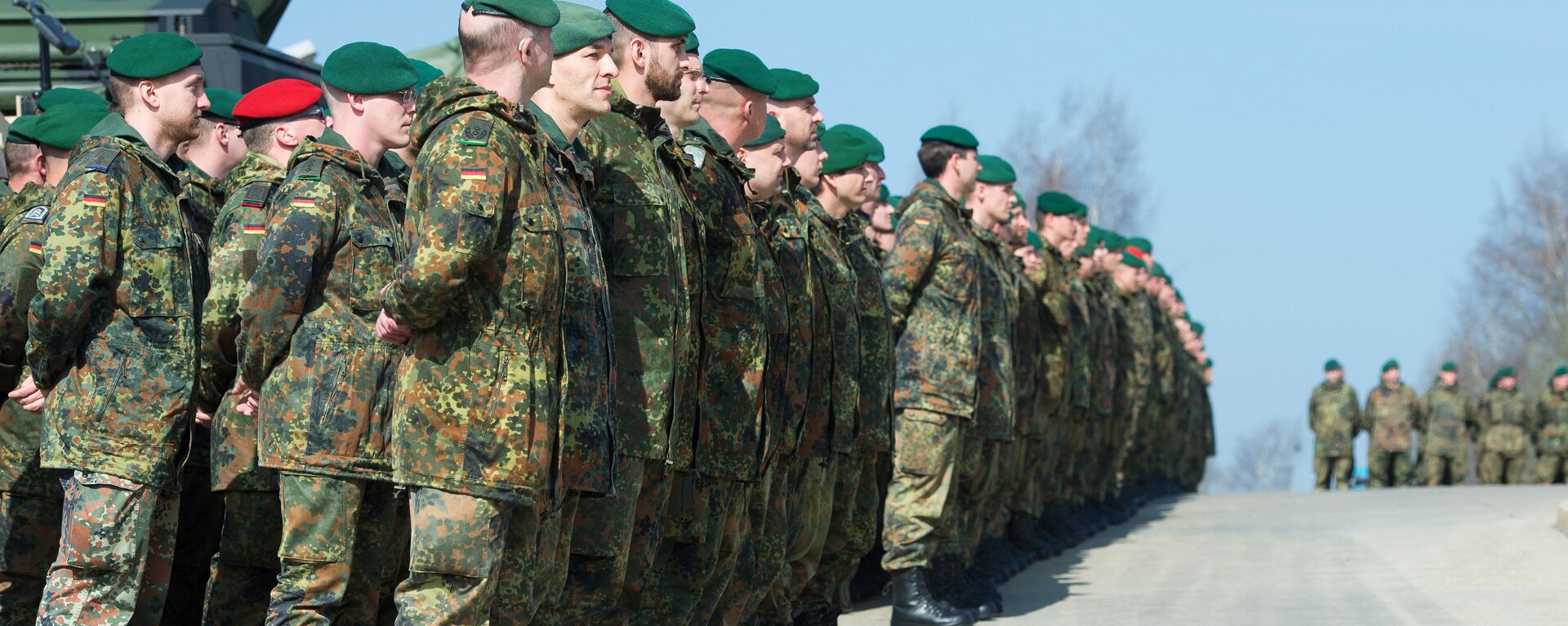
24 January 2022, 12:15 GMT
Why are the US and UK making things more tense?
"I think we should calm down and remember there's a very intense diplomatic process going on", says Weir. "The meetings are coming fast and furious, and Putin and Biden have spoken twice in the past month and a half. Sergei Lavrov and Antony Blinken meet often - most recently on Friday - and they keep agreeing to hold more talks. So that doesn't happen unless the two sides sort of see that something has to be done".
Biden's reported plan to resort to more decisive measures against Russia over Ukraine comes as Moscow is awaiting Washington's written response on Russia's draft security proposals submitted on 15 December 2021 to US policy-makers.
Russia's draft treaties include legally binding guarantees that NATO will not expand eastward, Ukraine will not be admitted to the western military bloc and member states that have joined the bloc since 1997 will quit its forces, among other measures.
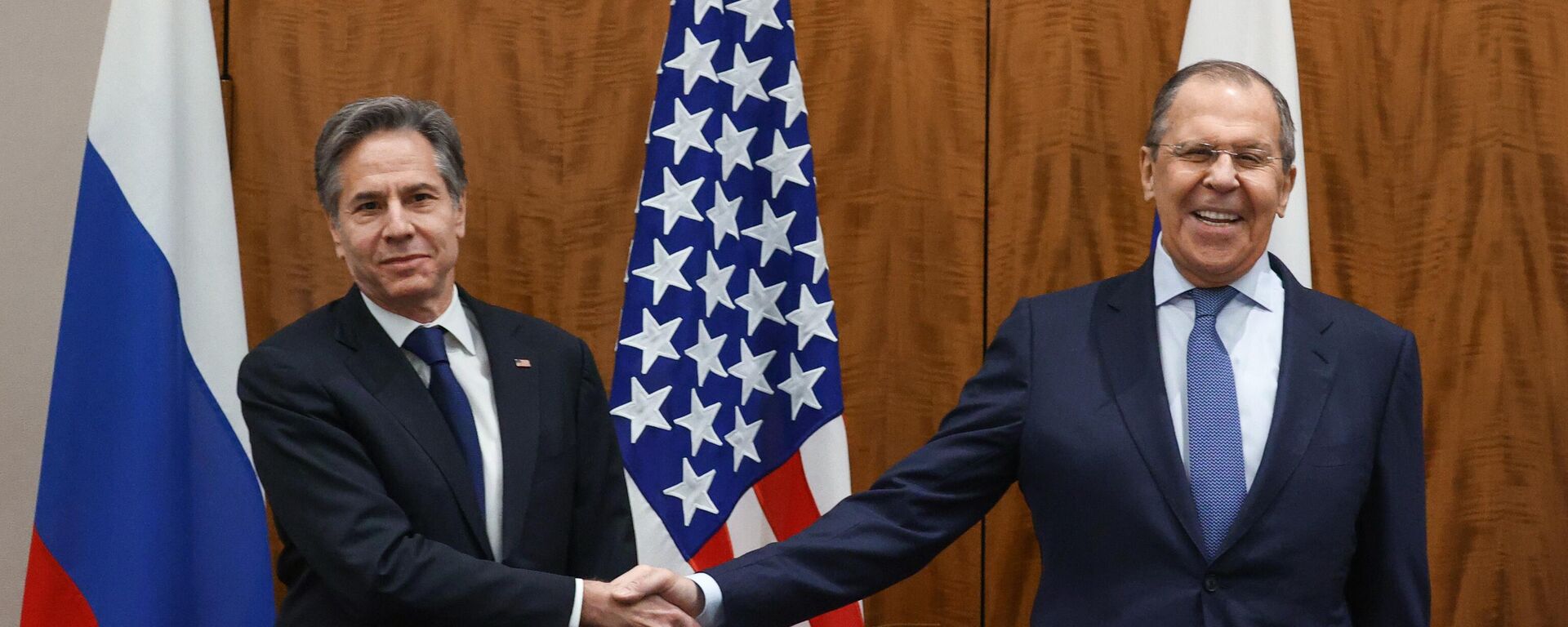
21 January 2022, 13:55 GMT
On 21 January, Russian Foreign Secretary Sergei Lavrov and his American counterpart Antony Blinken held "frank and substantive" talks, with the US secretary of state leaving the door open to address Russia's "security concerns".
However, Biden's decision to respond "in a reactive way" to Russia's security proposals provides the US president with no benefits in political popularity, says Gilbert Doctorow, an international relations and Russian affairs analyst.
"If Joe Biden only were … to concentrate wholly on providing this written response to the draft treaties that were submitted by Moscow to Washington on 15 December 2021… he would lose power in the American political environment", notes the analyst.
The show of strength largely serves the purpose of domestic politics, as the potential buildup "cannot in any way change the outcome of a potential conflict between Russia and Ukraine, which would be very heavily in Russia's favour", Doctorow added.
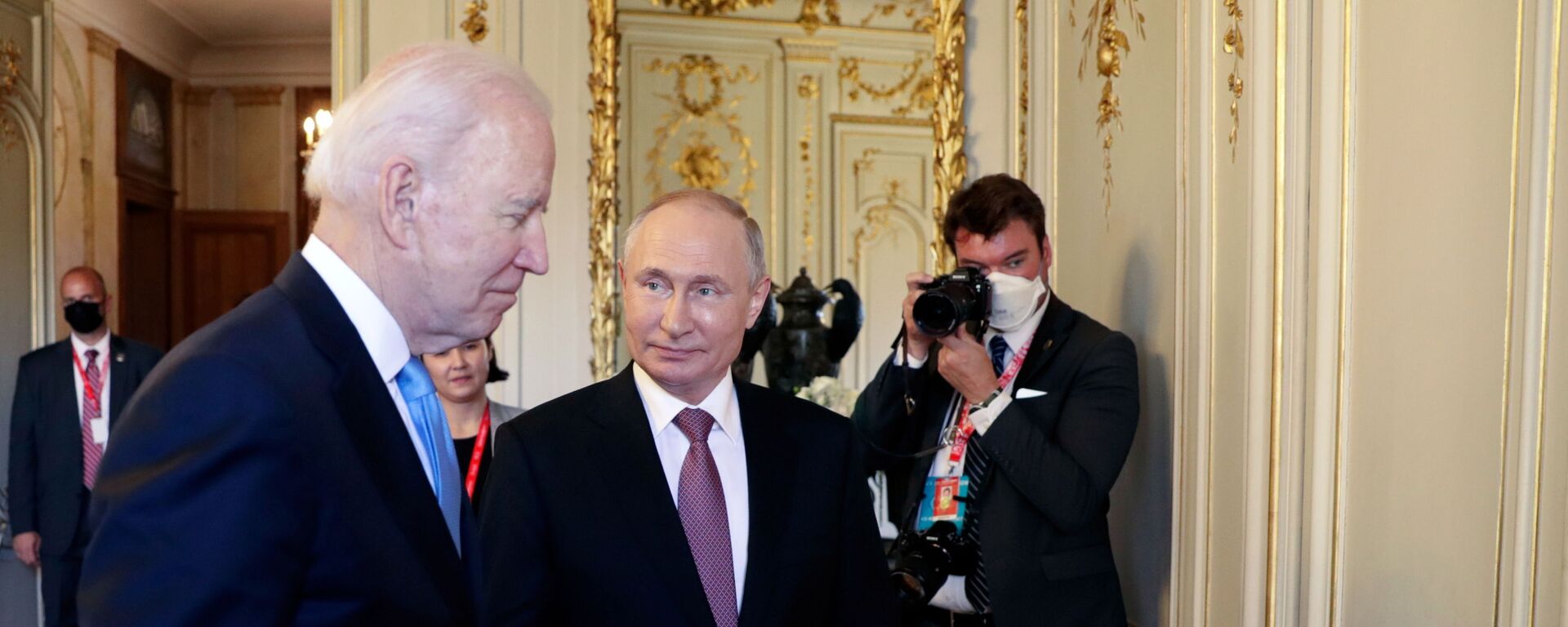
8 December 2021, 21:25 GMT
Biden's approval rating is in free fall over a chaotic Afghan withdrawal, soaring inflation, and the president's inability to pass any of his signature initiatives through the US Congress. Biden's apparent shift from his restrained stance on Ukraine is
aimed at breathing some life into the president's waning popularity, according to Doctorow.
"The US is in decline, so they have nothing to lose", Kasonta says. "As their clumsy withdrawal from Afghanistan last year proved, they don't care that much about public opinion. Yet, it doesn't mean that [international] public opinion doesn't care about US actions outside their borders or the sphere of influence defined by the Monroe Doctrine. Hypocrisy is a natural part of US hegemonic thinking, enormously nourished during the so-called 'unipolar moment' of the post-Cold War era".
Though the ongoing muscle-flexing may possibly be part of a broader diplomatic game, Weir warns that "that kind of posturing is in the wrong direction, definitely stepping up the danger of war".
"We remember how wars can start", the journalist says. "Just over a century ago, the First World War - the most insane war - started on the flimsiest pretext. It just developed out of a few incidents and miscalculations on all sides".
